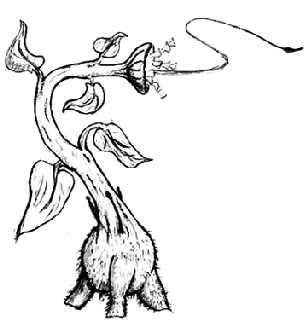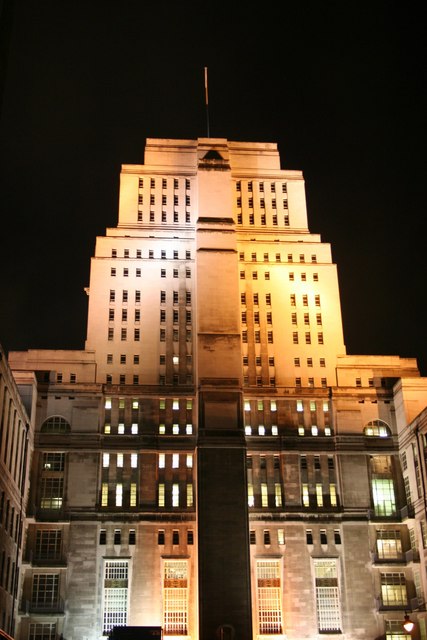1. The writing here catches a sardonic, conversational tone fantastically.
I had forgotten all about Susan until a voice came from above. "You are getting wet, you silly. Why don't you kiss her in-doors?" it asked.Though laughs populate the prose, this is a deeply dark and disturbing world, like Joseph Heller’s Catch-22. Here the laughs both lighten the depressing mood and assert man’s ability to survive the apocalypse with humor intact. Like a firefighter’s black sense of humor, which is an emotional survival method, Wyndham’s humor allows the reader places to catch their breath from the oppressing circumstances by losing it in laughter. Let me give an example from early in the book, on the day the whole world goes blind except for a very few, including Bill, who was a patient at the hospital:
But although there was no one in that part, there was certainly something going on in the saloon bar, round the corner. I heard heavy breathing. A cork left its bottle with a pop. A pause. Then a voice remarked: "Gin, blast it! T'hell with gin!" There followed a shattering crash. The voice gave a sozzled chuckle. "Thash th'mirror. Wash good of mirrors anyway?" Another cork popped. "S'darnned gin again," complained the voice, offended. "T'hell with gin." This time the bottle hit something soft, thudded to the floor, and lay there gurgling away its contents.This sets up the dialog pattern that Wyndham uses throughout to keep the reader entertained and informed. His sense of timing keeps the humor feeling natural, unforced. And outside of the dialog, he captures a conversational tone through having quite a few mid-sentence asides. Here’s an example from the first chapter:
"Hey!" I called. "I want a drink." There was a silence.
Then: "Who're you?" the voice inquired cautiously.
"I'm from the hospital," I said. "I want a drink."
"Don' 'member y'r voice. Can you see?"
"Yes," I told him.
"Well, then, for God's sake get over the bar, Doc, and find me a bottle of whisky."
"I'm doctor enough for that," I said.
The temptation to take a peep—not more than a peep, of course; just enough to get some idea of what on earth could be happening—was immense.This is a fun to read. A well-written book. The writing allows the characters to really have personalities and personality.
2. But not only is it a fun read, the writing is solid. Moments of beauty in description and emotional evocation litter the prose. The drunk's quick comment about mirrors foreshadows the fact that most cultural artifacts of humanity are inappropriate to a world gone blind, and through the uselessness of the artifacts, the book communicates how culture comes apart catastrophically. Nothing is dropped or ignored for too long to be a surprise when it comes back up. There is nothing overly breathtaking in the writing, except that the writing never disappoints. After reading this, I can remember no missteps in word choice or sentence structure. It communicates well and it’s a worthwhile read, while also being fun.
3. The structure starts in the middle of the action, then backtracks into Bill’s origins—keeping it all relevant to the character and topic at hand—before catching up and moving on with the story. The opening structure effectively sets up the story while the rest is a straight narrative. Wyndhan paces it well. He delves deeply into lengthy, interesting experiences, while pruning parts of the story that have less interest. For example, he won’t describe a commute in detail over pages, but he’ll give a single sentence or two through discussing how the length of the commute frustrates or frees Bill emotionally. This isn’t to say it’s all go-go-go action, come on let's get to a gun-fight, but everything that happens is important and influential to the narrative—whether it’s rumination or physical action, and this inherent importance adds to the writing being entirely readable.
4. However, I’m not sure why it ends where it does. My wife mentioned that a few of those last chapters could’ve been good endings as well, and I think I agree. But the ending itself draws back in one last thread of humanity and minor character in order to tie up that last loose end—if you can consider that minor character a loose end. I’m not sure he needed tied up, but the author chose to tie it up this way and it works. I was just hoping for one more chapter, a little more of an epilogue: a chapter of their last move to that new colony and describing the colony to some extent. It would’ve provided Wyndham the opportunity to end on a significantly hopeful note. As it is, it ends hopefully, but quickly. He doesn’t dwell too long on the hopefulness of the end, and I thought the ending could’ve benefited from a bit more of a discussion of the hope and path forward. He did such a wonderful job exploring the paths to failure in depth, but merely skims over the path to success so that it feels a little half-completed. It sticks out as inconsistent to me.
5. There are three themes here: first, he’s drawing philosophy, tensions, and situations from colonialism—to the extent of including a couple of extended discussions on "the other". Second, he’s discussing aspects of what became the Cold War: weapons proliferation, insular governments, breakdowns of communication, citizens living unaware but uneasy, and science perverted to only serve the use of militaries. Third, and I think this is the main theme here, he’s discussing a philosophy or logic for how humans should interact with each other: doing everything for others and respecting the strengths of another while compensating for their weaknesses as a group. Croker’s failed experiment was based on his self-deception about the situation and the possibilities of it. Wyndham encourages his readers to be adaptable and open-eyed, to think through issues realistically, and to rely upon each other in a symbiotic way. He pulls this off through keeping the story focused on the humans and the various ways they’re interacting, rather than focusing on the situation as a whole.
6. In short, this is a tight, well-written, funny, and interesting book. I was surprised by the quality of it and I enjoyed it immensely. I really only had a problem with one part: the slightly odd ending, but this didn’t ruin the book at all, it was merely a little different. At the end, due to the writing quality, I wonder what else John Wyndham has written?




No comments:
Post a Comment